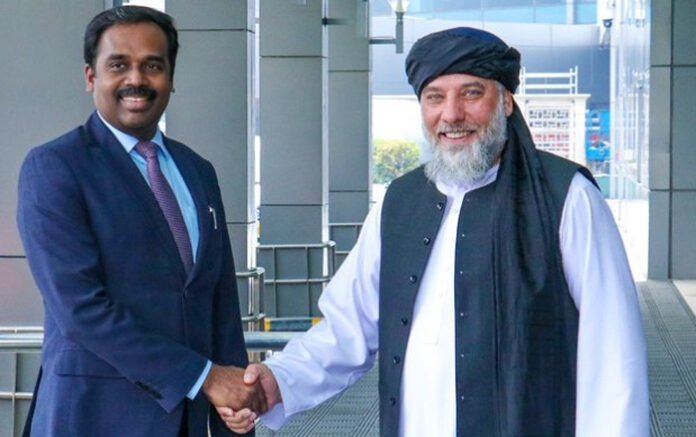New Delhi: In a significant diplomatic and economic move, Afghanistan’s Industry and Commerce Minister Alhaj Nooruddin Azizi began a five-day visit to India on November 19 to strengthen trade ties and explore alternative routes that bypass Pakistan amid heightened border tensions.
Azizi’s visit marks one of the most high-level engagements between India and the Taliban administration since 2021, signaling a subtle but notable shift in regional dynamics. Talks with Indian officials are expected to focus on enhancing the use of Iran’s Chabahar Port, expanding air cargo corridors, improving regional connectivity, and scaling up humanitarian assistance.
Focus on Chabahar Port to Reduce Pakistan Dependency
With Pakistan restricting transit access and border closures disrupting goods movement, Afghanistan is increasingly turning to India and Iran to keep trade channels active. The Chabahar Port, jointly developed by India and Iran, has emerged as a vital alternative for Afghan exports—especially agricultural goods, dry fruits, and handicrafts.
Officials familiar with the discussions said both sides will explore long-term frameworks for smoother customs, logistics, and shipping operations through Chabahar, allowing Afghan traders to reach global markets without depending on Pakistan’s land routes.
India’s Continued Support and $3 Billion in Assistance
Despite withholding formal recognition of the Taliban regime, India has provided over $3 billion in aid to Afghanistan since 2021. This includes food grains, essential medicines, COVID-19 vaccines, and infrastructure support under humanitarian and people-centric initiatives.
India is expected to reiterate its commitment to supporting Afghanistan’s basic needs while maintaining its stance on counterterrorism commitments and the protection of minorities and women’s rights.
Trade Already Crosses $1 Billion Annually
Bilateral trade between India and Afghanistan currently exceeds $1 billion, mostly routed through air corridors and Iran. Afghan exporters consider India one of their most reliable markets for dry fruits, saffron, carpets, and medicinal herbs.
Azizi is expected to meet business groups, chambers of commerce, and Indian policymakers to expand this trade footprint, pushing for tariff relaxations, easier market access, and joint ventures.
Security Concerns Remain but Economic Engagement Continues
While India remains cautious due to security concerns and the Taliban’s internal dynamics, New Delhi has signaled openness to limited functional engagement focused on humanitarian and economic stability.
Azizi’s visit, therefore, may serve as a step toward a more structured dialogue, even if it falls short of formal diplomatic recognition.
A Possible Thaw and Signals of Regional Realignment
The visit underscores Afghanistan’s attempt to recalibrate its regional partnerships and reduce overdependence on Pakistan, especially as cross-border tensions escalate. For India, it presents an opportunity to maintain influence in Kabul, safeguard security interests, and reinforce its position in regional connectivity networks.
As talks continue over the next few days, policymakers and analysts will closely watch for announcements on trade corridors, port usage, and long-term economic cooperation—potentially setting the tone for a new chapter in India-Afghanistan relations.
















